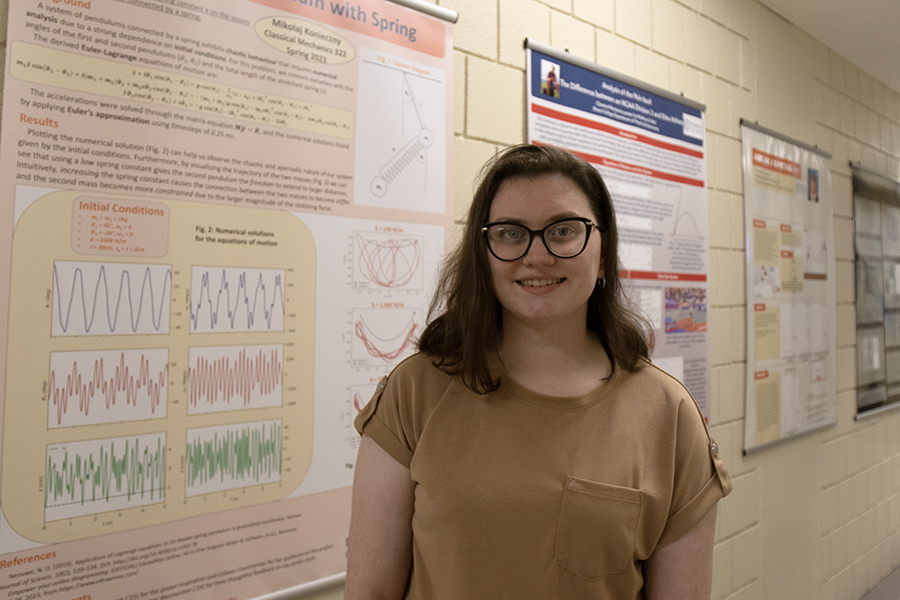Over the summer, senior Emily Leach, chemistry and applied physics double major, analyzed grades from two physics courses that ran during Fall 2022 and Spring 2023 to determine if a foundations section of Physics 101 would increase student success in Physics 101 and 102.
Leach said the Department of Physics and Astronomy had previously noticed students were entering Physics 101 with different levels of math proficiency. The department piloted an additional section of Physics 101, Foundations in Physics, for students who scored lower in math proficiency on their entry-level exams. The section ran in Fall 2022 and focused on building up students’ math skills at the same time as their physics skills. Students who scored higher on entry exams took the regular Physics 101 class.
Leach said she found Foundations in Physics to be extremely effective based on her observation and analysis of grades.
“I did my research after they held the class to see if this class was actually worth it and helped the students be more successful … than if they were in a regular course without the supplementary math information,” Leach said.
Leach’s research analyzing the trial class’s impacts was conducted as part of the Summer Scholars Program, which allows students to conduct school-funded research in an area of their choice. Leach said her interest in curriculum stems from her career goals to be a high school physics teacher.
“I want to be able to give these good strategies to my own students,” Leach said. “I can adapt my own teaching [in the future] and do this kind of research process so I can make my class better.”
Leach was a teacher’s assistant in the Fall 2022 Foundations in Physics trial class. In Spring 2023, those students moved on to Physics 102. During the summer, she compared test scores and overall grades in Excel to understand the difference between students who took Foundations in Physics and then Physics 102 versus students who took the previous Physics 101 class.
Leach said that prior to the foundations class, on average, 2% of students would either withdraw or receive a D or F for their final grade. She said that in the 2022–23 academic year, no one failed either course. Her data showed that 75% of students who took Foundations in Physics finished Physics 102 with a B or higher.
Colleen Countryman, assistant professor in the Department of Physics and Astronomy, is a physics education researcher and worked alongside Leach over the summer. Countryman also taught the trial foundations class of about 17 students. However, she said only a subset of them go on to take Physics 102, meaning the sample size is quite small.
“I would love to be able to run it more so that we could collect more data and people like Emily could come in and tell us how things are being impacted,” Countryman said.
Countryman said some physics content was removed to make room for a significant amount of math content to help students improve their performance in both areas, and increase confidence and their abilities. She said students come from many places and backgrounds, and that some may not have been given the chance to learn the material needed to succeed in introductory physics courses.
“I would hear these personal stories of students that would come in, sometimes in tears, feeling so much anxiety about math,” Countryman said. “We wanted to make sure that all students felt like they belonged in a physics classroom. That was the idea behind [the class] and we took some data on that and tried to determine how efficient it was at actually achieving our objectives.”
For the 2023–24 academic year, the section of Physics 101, Foundations in Physics, is not being taught. However, Countryman said the department is in conversation with the college about running the alternate section again in the future.
Matthew Sullivan, chair of the Department of Physics and Astronomy at the college, said that last fall, they had the staff to teach the class as no faculty members within the department were on sabbatical, but that it was not the case this year.
“We have to make sure that we can still teach,” Sullivan said. “Something else has to give and that’s the question that was whether or not, if anything we can remove in order to teach this new section.”
Countryman also said the department has been holding ongoing conversations about new curricular developments and logistics around staffing for the class.
“This department is a really special one, in that the faculty here are incredibly invested in making sure that we’re teaching the best way that we can and that we’re getting through to our students and that we’re keeping our students and making them feel welcome,” Countryman said. “[Leach’s research] is one factor in this sort of ongoing conversation about all these different initiatives that our department is doing.”








